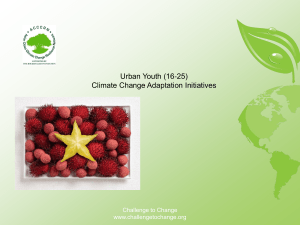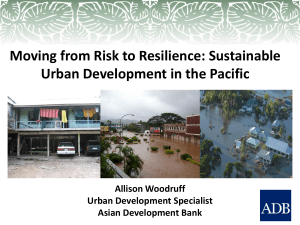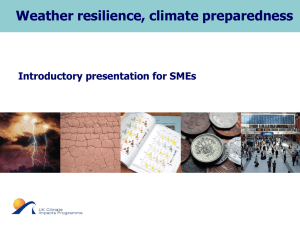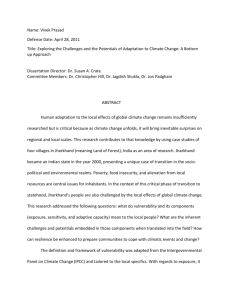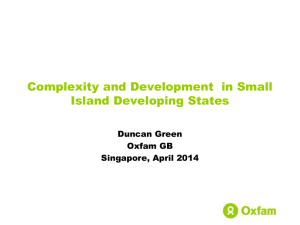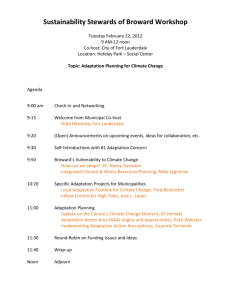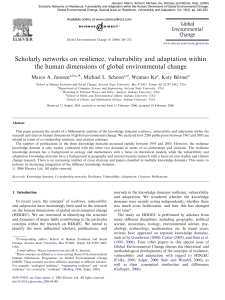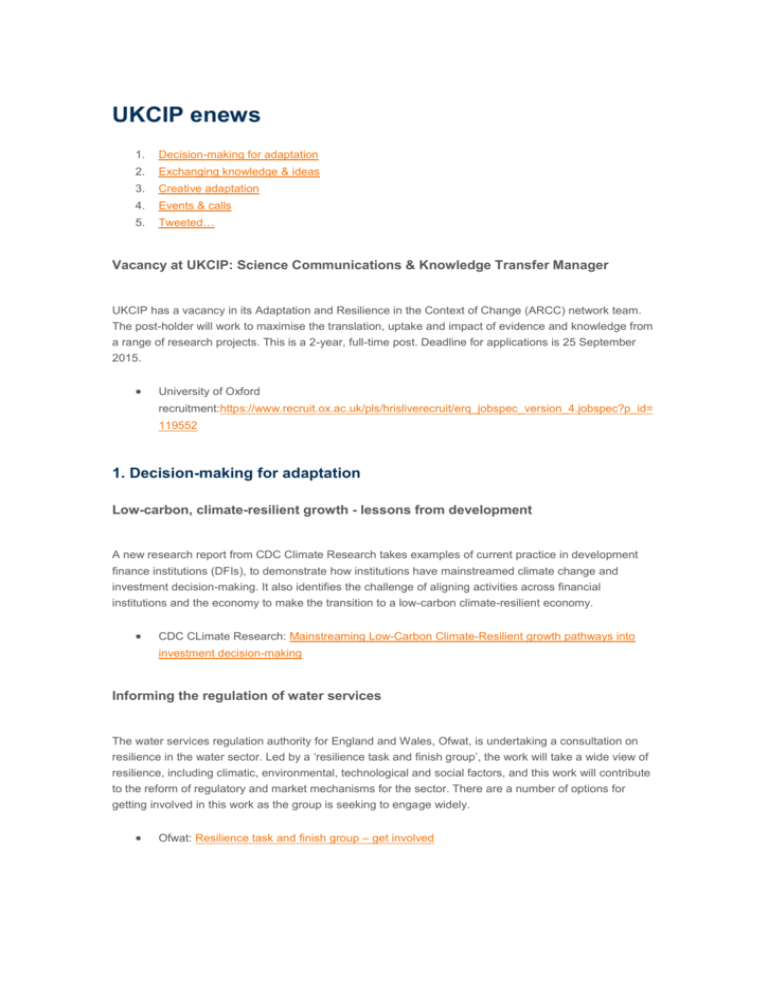
UKCIP enews
1.
Decision-making for adaptation
2.
Exchanging knowledge & ideas
3.
Creative adaptation
4.
Events & calls
5.
Tweeted…
Vacancy at UKCIP: Science Communications & Knowledge Transfer Manager
UKCIP has a vacancy in its Adaptation and Resilience in the Context of Change (ARCC) network team.
The post-holder will work to maximise the translation, uptake and impact of evidence and knowledge from
a range of research projects. This is a 2-year, full-time post. Deadline for applications is 25 September
2015.
University of Oxford
recruitment:https://www.recruit.ox.ac.uk/pls/hrisliverecruit/erq_jobspec_version_4.jobspec?p_id=
119552
1. Decision-making for adaptation
Low-carbon, climate-resilient growth - lessons from development
A new research report from CDC Climate Research takes examples of current practice in development
finance institutions (DFIs), to demonstrate how institutions have mainstreamed climate change and
investment decision-making. It also identifies the challenge of aligning activities across financial
institutions and the economy to make the transition to a low-carbon climate-resilient economy.
CDC CLimate Research: Mainstreaming Low-Carbon Climate-Resilient growth pathways into
investment decision-making
Informing the regulation of water services
The water services regulation authority for England and Wales, Ofwat, is undertaking a consultation on
resilience in the water sector. Led by a ‘resilience task and finish group’, the work will take a wide view of
resilience, including climatic, environmental, technological and social factors, and this work will contribute
to the reform of regulatory and market mechanisms for the sector. There are a number of options for
getting involved in this work as the group is seeking to engage widely.
Ofwat: Resilience task and finish group – get involved
A decade after Katrina, some different views of New Orleans’ future
It is 10 years since New Orleans was devastated by Hurricane Katrina, and these two news articles
present different views of the city’s future. On the one hand, there are opportunities to recreate the city,
using the proximity of water as an opportunity for development and growth. Another view is that hard
engineering solutions have contributed to the region’s vulnerability with new and untested approaches
offering some radical solutions.
The Guardian: Reimagining New Orleans as America's most resilient waterfront city
The Guardian: Is New Orleans in danger of turning into a modern-day Atlantis?
Adapting to climate change – as well as all the other changes we face
Communities are faced with adapting to many changes (e.g. social, climatic, economic) and a recent
research paper offers a framework for integrating these multiple challenges when assessing vulnerability
and developing adaptation responses. The authors took coastal communities as their theme, and
reviewed existing evidence on drivers of change to develop their framework and other tools to assist
effective adaptation.
Regional Environmental Change: Communities and change in the anthropocene: understanding
social-ecological vulnerability and planning adaptations to multiple interacting exposures
2. Exchanging knowledge & ideas
Risks of extreme weather to global food system
The global food system will be increasingly vulnerable to extreme weather according to a group of
academics, industry and policy experts. ‘Extreme weather and resilience of the global food system’ brings
together evidence of the likely impacts on food production of extreme weather. The report, published by
the Global Food Security Programme, concludes that there is a growing risk of major shocks to
production, with the efficiency of the global food system now contributing to its vulnerability. The authors
call for action to improve the resilience of the global food system.
Global Food Security: Extreme weather and resilience of the global food system (pdf, 2.8 MB)
The Guardian: Food production shocks 'will happen more often because of extreme weather'
Open data – LIDAR archive available from this month
From this month (September 2015), the Environment Agency is to make its LIDAR (Light Detection and
Ranging) data available, for free, to all. The move is part of the Department for Environment, Food and
Rural Affairs’ (Defra) bid to make all its data more open in order to stimulate new services and innovative
resources.
GDS blog: Defra's opening up its data
Environment Agency blog: Free mapping data will elevate flood risk knowledge
Environment Agency Geostore: Datashare
Future droughts threaten British butterflies
A new study published in Nature Climate Change on the impacts of drought on British butterflies has
concluded that these symbols of the British summer could struggle to adapt as our climate changes, with
extinction a possibility for some species in some areas. While some butterflies were able to migrate to
more suitable environment, this won’t happen everywhere, particularly where there is already pressure on
agricultural land.
Climate News Network: Carbon emissions threaten British butterflies
Results of 10-year simulation of Danish 2075 climate on ecosystem
In the CliMA!TE project, researchers in Denmark undertook a 10-year field study to investigate the
impacts on terrestrial ecosystems of the likely Danish climate of 2075. Now the project has concluded, an
overview report describes the impacts on plants, soil organisms and ecosystems. The project explored
the responses that arise from a variety of climate changes on an ecosystem.
Impacts of climate change on terrestrial ecosystem functioning (pdf, 23.9 MB)
Collaborations based on values work better than those focused on issues or events
In a response to author and activist Naomi Klein’s suggestion that climate change “changes everything”,
Amanda Tattershall explores just how to get “everyone” together to make those changes. The article
concludes that building relationships between disparate groups before taking action is more effective than
enforcing a prescribed plan.
The Conversation: How do we ‘change everything’ as Naomi Klein suggests? Let’s start by
getting ‘adversaries’ to listen to one another
3. Creative adaptation
State of Green – climate services website from Denmark
A new online resource promises to share Danish expertise on a range of climate change themes,
illustrated with examples and case studies. ‘State of Green’ is a new website, devised as a collaboration
between the public and private sectors, to promote Danish climate services, including adaptation.
State of Green: Discover Denmark's solutions for a greener future
Climate Registry for the Assessment of Vulnerability – CRAVe
The adaptation community in the USA is being encouraged to pool its information on vulnerability
assessments. The Climate Registry for the Assessment of Vulnerability (CRAVe) aims to share
information about existing vulnerability assessments so these can have greater impact by being used by
others or developed further. CRAVe is searchable (although a little clunky) and will get additional
exposure by being integrated into CAKE – the Climate Adaptation Knowledge Exchange site maintained
by EcoAdapt.
USGS: CRAVe
Climate Adaptation Knowledge & Exchange
4. Events & calls
Adaptation Sub-committee looking for two new members
Closing 12 October
Further details
Introduction to the UK Climate Projections
19 October 2015, Environment Agency webinar
Book your place
Climate change: innovation for resilience and adaptation
20 October 2015, Manchester, UK Business Council for Sustainable Development
Information and booking
Adaptation Futures 2016
10–13 May 2016, Rotterdam, Netherlands
Call for submissions of sessions and science abstracts – deadline 4 October 2015.
5. Tweeted…
Small-scale experimentation to improve policy-making – makes perfect sense
|http://bit.ly/1UUQBFs @designcouncil
What can social learning contribute to complex problems such as climate change?
|http://bit.ly/1Ff9LN7 @cgiarclimate
New @NASA videos show stark loss from earth's ice sheets | http://bit.ly/1ifSUVE@CarbonBrief
Lessons learned from Katrina – invest in risk reduction, resilient infrastructure & flood management
@Zurich http://bit.ly/1JTW1im
Some new British homes are imaginative, sustainable & affordable – let's build more!
|http://bit.ly/1DX3omC @guardianculture
Taking care of vulnerable people in extreme heat – how NY manages health risks
|http://1.usa.gov/1J7J1TP @NOAAClimate
Shade balls – simple but ingenious way of reducing reservoir evaporation
|http://bit.ly/1WletDP @guardian
Follow on Twitter | Forward to Friend
Copyright © 2015 UK Climate Impacts Programme (UKCIP), All rights reserved.
You are receiving this newsletter as you signed up on the UKCIP website.
Our mailing address is:
UK Climate Impacts Programme (UKCIP)
University of Oxford, OUCE
South Parks Road
Oxford, Oxfordshire OX1 3QA
United Kingdom


